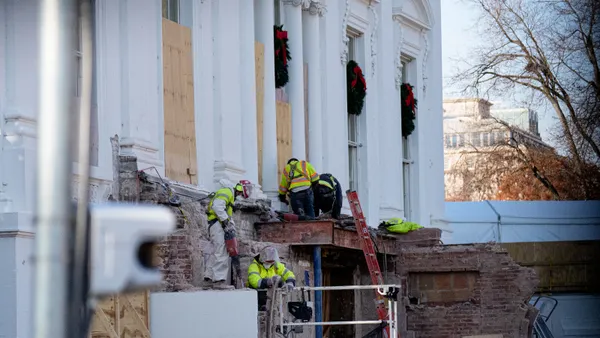UPDATE: June 10: A Michigan Court of Claims judge has ruled that Gov. Gretchen Whitmer exceeded her authority when she set possible felony penalties for employers that violate orders related to creating workplaces safe from the coronavirus.
In response to a lawsuit brought by the Associated Builders and Contractors of Michigan, Judge Christopher Murray ruled that the most severe penalty that can be imposed on companies violating Whitmer’s emergency orders is a misdemeanor, which brings with it a fine of much less than the maximum $70,000 fine in Whitmer's order. This means that the penalties referenced in Whitmer’s May 21 order are unenforceable, Murray added.
Dive Brief:
- The Associated Builders and Contractors of Michigan has filed a lawsuit against Michigan Gov. Gretchen Whitmer and two other state officials and is asking the state's court of claims to scuttle two emergency COVID-19 safety orders the association said are unconstitutional. The ABC of Michigan's co-plaintiff is a local landscape contractor, DJ's Lawn Service Inc. doing business as DJ's Landscape Management.
- The lawsuit focuses on two of Whitmer's executive orders, No. 2020-96 and No. 2020-97. The nonprofit Mackinac Center for Public Policy, along with the Miller Johnson law firm, filed the complaint on behalf of the ABC of Michigan and DJ's Lawn, saying the orders' strict safety measures — i.e. temperature taking and social distancing — were implemented outside the legislative process. The center also said the governor overreached and raised the potential penalty for violating the orders from a statutory 90-day jail sentence and a $500 fine to a potential felony punishable by a three-year jail sentence and up to $70,000 per occurrence.
- The plaintiffs have asked the court to declare Order No. 2020-97 invalid and No. 2020-96 unenforceable, saying that the two orders violate the U.S. and Michigan constitutions. The lawsuit also asks the court to prevent Whitmer, the state's Attorney General's Office and the Michigan Department of Health and Human Services from enforcing the two executive orders.
Dive Insight:
The lawsuit alleges that COVID-19, as it exists in the state of Michigan, no longer constitutes an emergency that requires "unilateral executive action." In fact, the ABC of Michigan complaint said that on April 27, Whitmer acknowledged at a press conference that the state had "flattened the curve" of new cases.
According to the lawsuit, the Whitmer administration projected hospitalization of 220,000 (without social distancing) but, as of April 27, there were only 3,000 novel coronavirus-related hospitalizations. At that time, the state also reported that its hospitals were well stocked with ventilators, had 1,000 free ICU beds and 6,000 available hospital beds.
As of May 27, the daily number of confirmed COVID-19 cases had not be going down for two weeks, according to Michigan state data.
Jeff Wiggins, the director of ABC of Michigan, told Construction Dive that when it comes to safety protocols, the measures in Whitmer's orders were things that construction companies were already doing. In fact, he said, construction is one of those industries that has the ability to operate relatively safely during the pandemic.
OSHA considers construction a lower-risk industry when workers perform their tasks more than 6 feet apart and a medium-risk industry when workers must maintain less than 6 feet of distance between each other in order to carry out their duties. Construction workers are at the most risk when they work inside of occupied buildings.
The safety measures themselves are not an issue, he said. "It is the enforcement of these regulations. You want to make sure that there are checks and balances in place."
Wiggins said that Whitmer, in putting together her executive orders, took "bits and pieces" from two or three laws to make an "a la carte" law. As is, he said, the rules are confusing and do not provide those subject to the orders with an adequate degree of certainty.
On March 24, Whitmer limited construction activity to essential projects only in Executive Order No. 2020-21, also known as the “Stay Home, Stay Safe” Executive Order. Projects that were allowed to continue included those necessary to maintain and improve roads, bridges, telecommunications infrastructure and public health infrastructure like hospitals. Emergency maintenance work to residences was also permitted. Otherwise, construction projects were shuttered, and no work was allowed to begin.
On May 7, Whitmer allowed construction work to resume as long as contractors adopted prescribed safety protocols like:
- Designating a site supervisor to assure execution of COVID-19 control strategies.
- Conducting daily health screenings for workers.
- Creating dedicated entry points or some other protocol to ensure all workers are screened.
- Controlling high-risk bottleneck areas on a jobsite to ensure social distancing.
- Providing the necessary hand-washing and hand-sanitizing facilities and/or stations at work sites.












